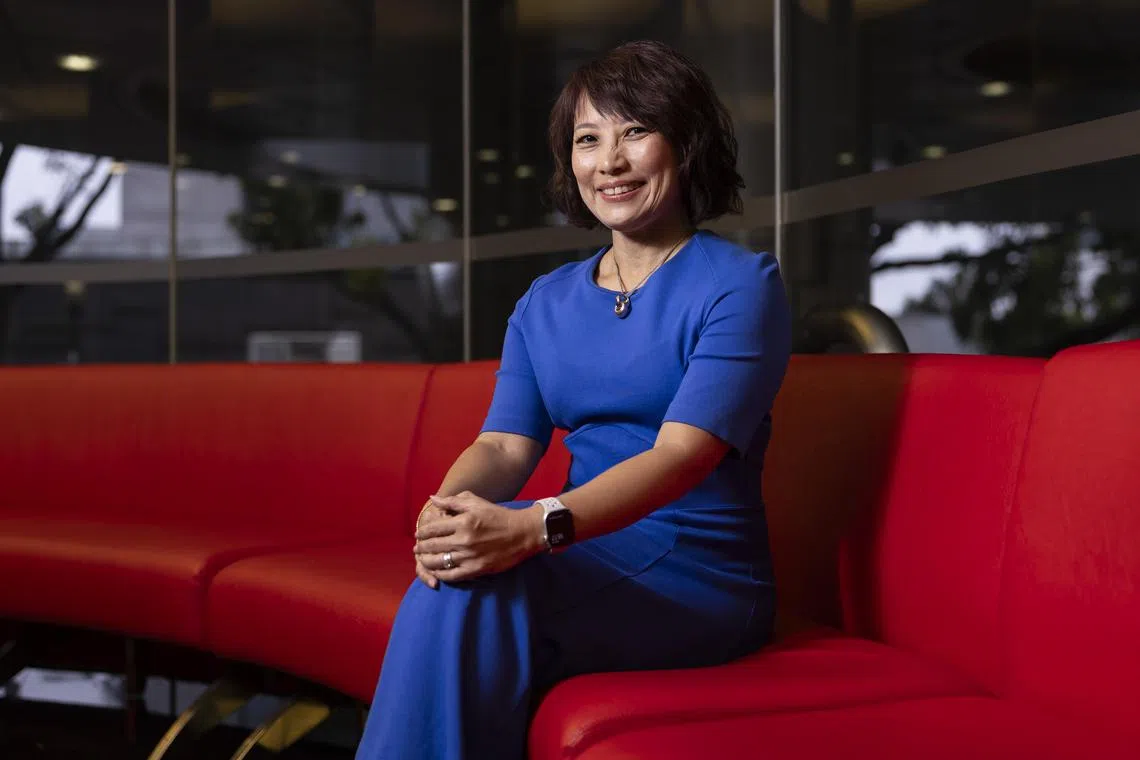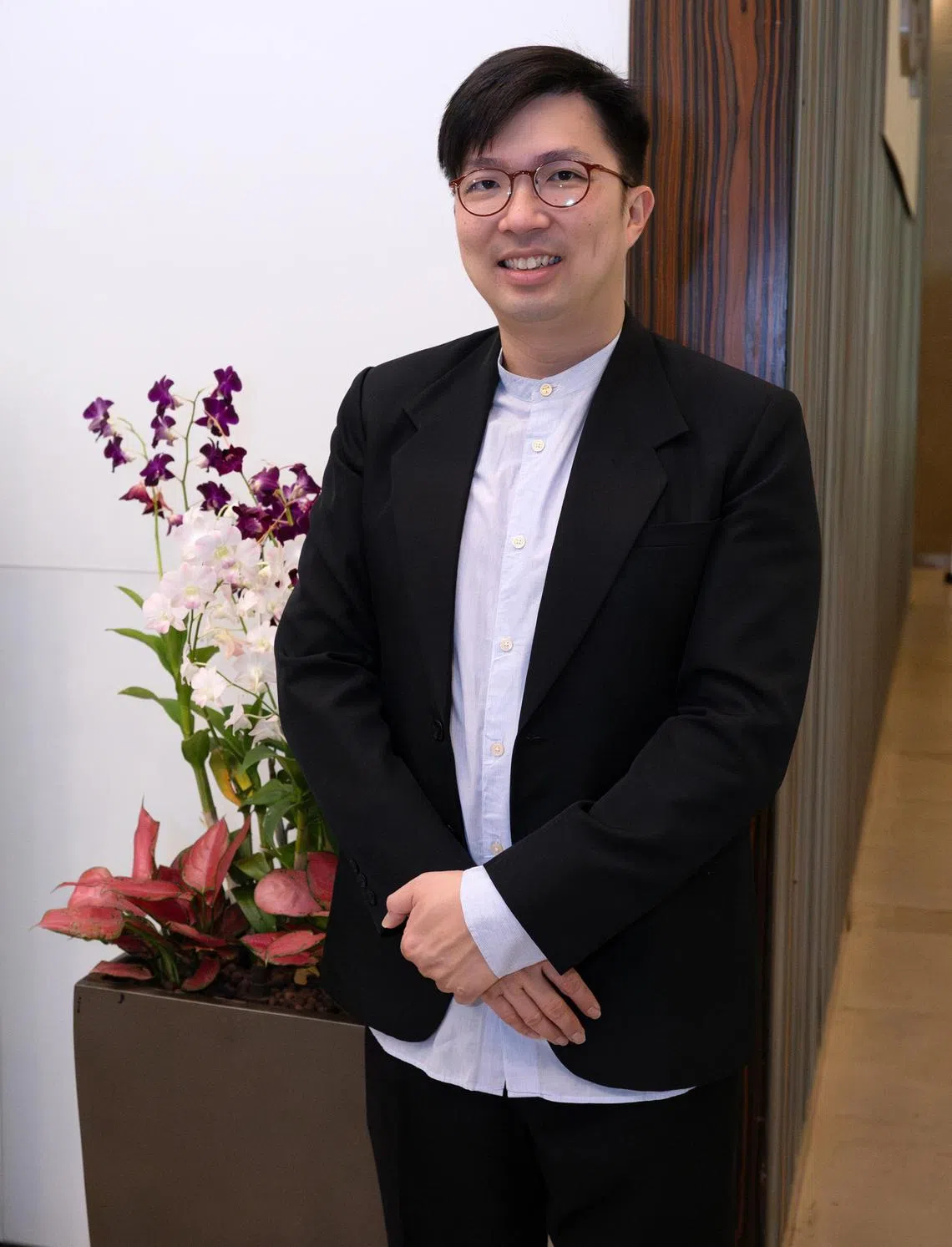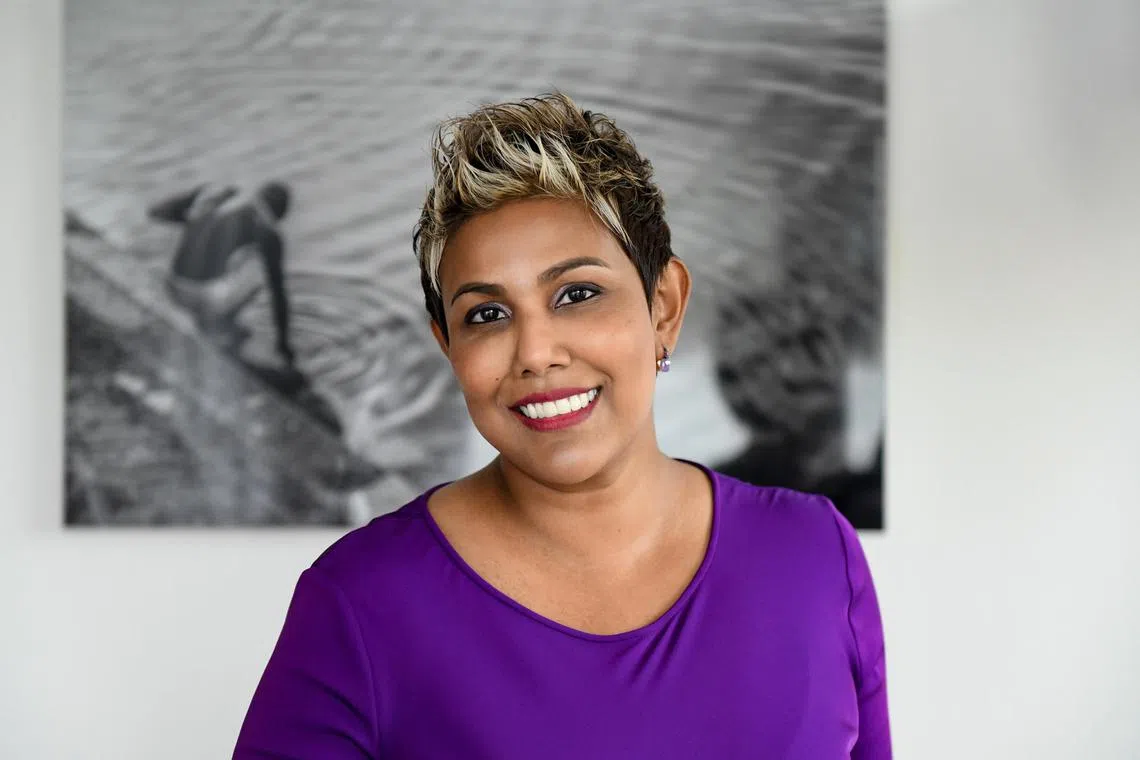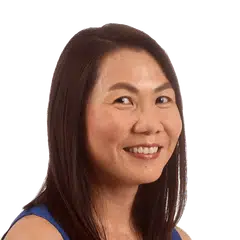Her Health Matters
Brain fog, anxiety and hot flushes at work: Menopause’s impact on careers and well-being
Sign up now: Get ST's newsletters delivered to your inbox

Ms Christina Ang started HeyVenus Integrated Healthscience after she saw the impact of a menopause advocacy taskforce she had co-chaired.
ST PHOTO: BRIAN TEO
Follow topic:
SINGAPORE – Ms Heena Kohli was 45 in 2023 when she experienced hot flushes so bad that she used ice to cool herself down at night.
The avid runner, who clocked 10km daily and ate mindfully, put on about 10kg in 18 months.
“I started to have brain fog. I couldn’t remember people’s names at work,” says the Singapore permanent resident. She is regional lead for sales, learning and effectiveness for the Asia-Pacific (Apac), Middle East and Africa, and China in a fintech multinational. She manages a team of seven across the three regions.
“My energy levels dropped completely and I had a hard time focusing on work and managing my anxiety.”
Her symptoms eased after her work leader recommended an ayurvedic expert based in India, who told her to eliminate sugar and caffeine, among other dietary changes, and introduced her to yoga and meditation.
Ms Heena’s experience is mirrored in workplaces across the globe, as the first generation of women to work full time in large numbers hits the menopause transition, often during their career peak.
Women reach menopause when they have no periods for 12 consecutive months. During the period leading up to that, called perimenopause, many experience a variety of symptoms caused by fluctuating hormone levels that can last up to a decade.
In Singapore, women typically reach menopause between the ages of 45 and 55, with 49 being the average age. This is earlier than the average age of 51 in Western societies.
White paper findings
Menopause is not just a women’s issue, but also a workforce issue, according to a ground-breaking new white paper by the NUS Bia-Echo Asia Centre for Reproductive Longevity and Equality (ACRLE) and femtech start-up HeyVenus Integrated Healthscience.
The white paper surveyed 1,741 working women aged 20 to 60 across Singapore, Vietnam, Australia, Japan and Indonesia. A quarter of the respondents were from Singapore, including Ms Heena.
Two-thirds of working women in Apac aged 45 and up reported that menopause symptoms disrupted their professional and personal lives.
Among Singapore-based female employees, almost three-quarters experienced at least two menopause-related symptoms that interfered with their ability to do their jobs and diminished their quality of life, the white paper notes.
The top menopausal symptoms respondents reported included feeling tired, hot flushes, vaginal dryness, night sweats, and joint and muscle pains.
Slightly over half the Singapore-based women polled held middle to senior leadership roles, a reflection of the strides women have made in the workplace over the past few decades.
The white paper addresses a “critical data gap” on how menopause affects women’s well-being in Apac as well as how Asian women experience menopause, says Adjunct Assistant Professor Huang Zhongwei. He is deputy director of ACRLE, a research centre established under the NUS Yong Loo Lin School of Medicine that works to extend women’s reproductive healthspan, or years of good health.
Not just a health issue
“Menopause is not just a health issue, but also a workforce and economic imperative that demands immediate attention. Ignoring menopause in the workplace has tangible costs, including absenteeism, reduced productivity and loss of experienced talent, but menopause remains largely unaddressed in workforce and corporate policies,” says Prof Huang.
“This isn’t just an individual challenge. It creates a cascading impact on team performance, strategic decision-making and overall organisational effectiveness. When key leaders struggle without adequate support, business continuity, talent retention and workplace productivity are at stake.”
Prof Huang and Ms Christina Ang, founder and chief executive of HeyVenus, will present key findings from their white paper to business leaders at a not-for-profit event on April 23. Proceeds will go to ACRLE and the Singapore Medical Association to fund tuition for medical students from underprivileged backgrounds.
Bridging the global menopause gap represents a potential gain of US$120 billion (S$160.6 billion) in annual gross domestic product, according to a report titled Blueprint To Close The Women’s Health Gap: How To Improve Lives And Economies For All.

Menopause is a workforce issue that has tangible costs when ignored, says Professor Huang Zhongwei, deputy director of the NUS Bia-Echo Asia Centre for Reproductive Longevity and Equality at the NUS Yong Loo Lin School of Medicine.
PHOTO: ACRLE
It was published in January by the World Economic Forum, in collaboration with the McKinsey Health Institute, which is part of American multinational strategy and management consultancy McKinsey & Company.
Menopause was highlighted in the report as one of nine conditions driving a third of the women’s health gap.
“Long-term effects of menopause and untreated symptoms lead to increased risk of chronic conditions, such as cardiovascular disease, neurological diseases (for example, depression, dementia), osteoporosis, Type 2 diabetes mellitus and other gynaecological conditions,” the report said.
Working women struggle in silence
One of the striking findings was that over 40 per cent of female employees in Singapore felt “completely uninformed” about menopause, which was close to the Apac figure of 45 per cent.
This reveals a major knowledge gap, Prof Huang says. Many women still feel that menopause is a taboo subject and rely on the internet or family members for information rather than consulting healthcare professionals.
The white paper found that almost seven in 10 working women in Singapore feel that social stigma prevents them from openly discussing menopause symptoms and seeking support in the workplace.
Ms Uma Thana Balasingam, 47, was preparing for a leadership forecast call in August 2023 when her right arm suddenly locked up and she could not move it beyond her lower back.
“Suddenly unable to perform basic tasks, I felt embarrassed and vulnerable,” says Ms Balasingam, who was then vice-president of sales in a tech company managing teams across Apac.
She spent hundreds of dollars a week on rehabilitation and other types of therapy over the next 13 months after medical experts told her it was not frozen shoulder, a common perimenopause symptom. The incident came two years after she gained about 5kg despite an active lifestyle.

Ms Uma Thana Balasingam, founder of The Elevate Group, says perimenopause symptoms such as weight gain and a frozen shoulder affected her confidence and productivity in her former job as a vice-president of sales in a tech company.
PHOTO: COURTESY OF UMA THANA BALASINGAM
“The constant self-blame and confusion were exhausting and took a bit of a toll on my mental and emotional well-being,” Ms Balasingam says.
“I didn’t try to discuss my symptoms with colleagues or even bosses, simply because I myself couldn’t explain what was happening. I had a high-stakes role and I think many can identify with this – you just get on with it. You do your best to seek help from all the resources at hand and I was privileged enough to do so.”
She started feeling better only when she started taking ownership of her health by tracking data points like her muscle mass, body fat percentage and hormonal changes, as well as educating herself about the menopause transition and changing her exercise routine to focus on strength training.
Helping workplaces support midlife women
With women making up almost half of the labour force in 2024 and the retirement age set to increase to 65 by 2030, more needs to be done in educating women and employers on menopause, say experts.
“Often, women either do not see the opportunity or fear to discuss menopausal symptoms and how they may affect their job performances. Particularly, women in higher positions and in competitive workplaces do not discuss menopause for fear of being ridiculed, stereotyped or stigmatised,” says Associate Professor Rukshini Puvanendran, co-director of the KK Menopause Centre. She is also head and senior consultant at the Family Medicine Service in KK Women’s and Children’s Hospital.
“Inadequate workplace support for menopausal women can potentially lead to significant costs through lost talent, reduced productivity and increased turnover, ultimately impacting both organisational success and women’s career progression,” she adds.
Dr Tashiya A. Mirando is lifestyle medicine co-lead and menopause lead at Osler Health International, a private family medicine clinic in Singapore. She says perimenopause symptoms can cause misunderstandings at work, leading to discrimination.
“I see many women citing mental health and burnout for taking a break from work, with one of the common under-recognised root causes for their symptoms being perimenopause,” she adds.
Osler Health ran a series of Menopause Summit events in March, including the first local screening of The M Factor: Shredding The Silence On Menopause (2024), a ground-breaking American documentary on the menopause health crisis.
Normalising menopause
Ms Ang, who is in her early 50s, started HeyVenus after she saw the impact of a menopause advocacy taskforce she co-chaired in a previous human resource role at a bank. She says that normalising menopause matters in the workplace starts at the top.
She recalls watching a male chief executive at a multinational company tell a townhall meeting how his wife’s menopause symptoms affected her productivity and confidence.
“When a leader normalises a conversation like this, it empowers employees to speak up, reduces stigma and fosters an inclusive work environment where menopause is recognised as a business and well-being priority,” she says.
Companies can also hold menopause awareness training sessions so employees have the skills and knowledge to support their female colleagues going through midlife, and integrate menopause into their broader well-being programmes rather than framing it as a “woman’s issue”, she adds.
Only a third of workplaces in Singapore have menopause-friendly policies, the white paper found. These include Unilever, a fast-moving consumer good company, and Standard Chartered Bank.
Another such company is HSBC Singapore, which launched menopause benefits in January for its almost 4,000 staff here. The bank provides up to $10,000 of menopause support, which includes specialist consultations and treatments, as well as alternative therapies such as traditional Chinese medicine.
“With a significant proportion of female staff in HSBC Singapore falling within the menopausal age bracket, it is important that we take a proactive approach to support them through this natural but often challenging phase of life,” says Mr Mukul Anand, its head of human resources.
Secretary Khatijah Othman, 49, who has worked with HSBC for 27 years, says the benefits help in terms of cost, as she falls within the sandwich generation caring for the young and elderly. She has two children aged 12 and 23 and intends to visit her gynaecologist soon.
She started experiencing perimenopausal symptoms about two years ago, when she started having hot flushes, became easily triggered and felt tired after disrupted sleep. Recently, she has also been having night sweats.
The bank’s hybrid working policy, which requires her to work in the office three days a week and allows for staggered start and end times, has also been a boon as “it gives me a bit of an avenue to recharge”.
Ms Balasingam, now founder of The Elevate Group, which offers a private network for senior female executives and consultancy services to empower women in the workplace, has also been doing her part to normalise this taboo topic among working professionals.
Since 2025, she has been sharing her journey every Sunday in a series called Perimenopause Diaries on professional network LinkedIn, which has received warm responses from women and men alike.
“We’re half of the world’s population and every woman will go through menopause. We can wait for the research dollars to be meaningful enough to catch up, or we can take action and share. Every woman’s experience will be different,” she says.
This is the third in a limited series about women’s health topics.
Stephanie Yeo is senior correspondent at The Straits Times’ Life section.


